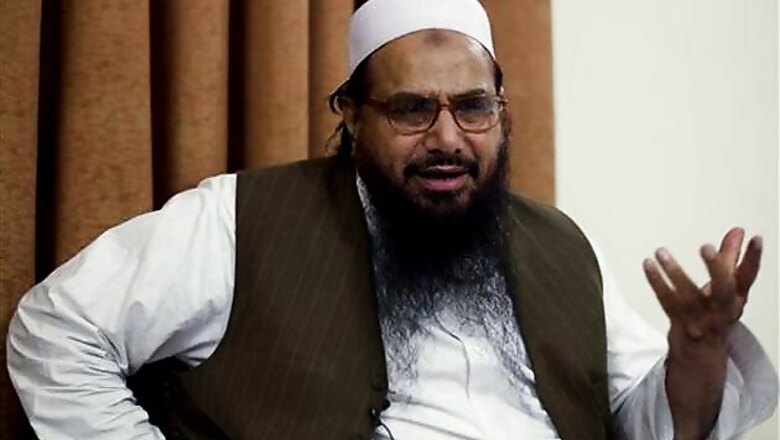
views
Washington: Hafiz Saeed's vision is "destruction" of India, says US counter-terrorism expert Bruce Riedel, maintaining that the Pakistan-based Lashkar-e- Toiba founder is an al Qaeda ally who was in close touch with Osama bin Laden until his death in May 2011.
"Saeed, a very public figure in Pakistan and admired by its military, advocates a truly extreme vision: the restoration of the Mughal empire and the destruction of India," Bruce Riedel, a former CIA officer and now a senior fellow in the Seban Center at Brookings Institute, said.
America's decision to announce a bounty of $10 million on Saeed would further deteriorate its relationship with Pakistan, he wrote in 'The Daily Beast'. Saeed, he said, stayed in close contact with bin Laden until his death in May 2011 in a covert US raid, according to the material found in the al-Qaeda leader's hideout in Abbottabad, Pakistan.
"Saeed openly mourned bin Laden in a bitter eulogy the Friday after the SEALs delivered justice to bin Laden," wrote Riedel, who was among the three members appointed by US President Barack Obama to review and formulate a new Af-Pak policy for the administration.
Riedel said Saeed's ambitions are not limited to Kashmir alone. "It is destruction of India. LeT's ideology as laid out by Saeed goes far beyond recovering the Muslim parts of Kashmir for Pakistan. He seeks the creation of a Muslim caliphate over the entire subcontinent. The LeT's role model is the old Mughal empire of the 17th and 18th centuries that dominated most of the subcontinent with a Muslim minority ruling the Hindu majority," he wrote.
"The vision of Saeed and his fellow leaders of LeT requires the literal destruction of India as a state. Saeed announced this goal in a speech in 1999 after the short Kargil war with India, saying, 'today I announce the break-up of India, Inshallah (God willing). We will not rest until the whole of India is dissolved into Pakistan'," Riedel wrote.
"One LeT newspaper captured the spirit of its ideology with this passage, 'Kashmir can be liberated in six months. Within a couple of years, the rest of the territories of India could be conquered as well, and we can regain our lost glory. We can bring back the era of Mughal rule. We can once again subjugate the Hindus like our forefathers'. As the US and India grow closer, the LeT increasingly sees America as its enemy," Riedel wrote.
Riedel said Saeed and the LeT have also benefited for years from the patronage of the Pakistani army and ISI.
"He is a frequent guest at army functions and his headquarters near Lahore is guarded by nearby ISI offices. Saeed's current campaign to stop the drones, to keep NATO supply lines to Afghanistan via Karachi closed and to sever US -Pakistan relations would not be possible without the support of the ISI," he said.
"By putting a bounty on his head now, the Obama administration has not only raised the ante with LeT, it has considerably raised the ante with its patrons and protectors in the Pakistani army," Riedel said.
Separately, an investigative US media website said that the announcement of $10 million bounty on Saeed's head shows the Obama administration has decided to take a hardline with Islamabad.
The ProPublica, which has done a series of investigative stories on the Mumbai terror attacks and David Coleman Headley, said that Saeed has a close relationship with ISI.
"As we reported, Headley revealed that Saeed helped plan the Mumbai attacks. He credited Saeed for inspiring him to 'jihad' and, after his arrest, told interrogators about Saeed's ties to Pakistani intelligence.
'He is very close to ISI,' Headley said of Saeed. 'He is well protected'," it said in its latest article following the announcement made by the State Department. It said the announcements show how much US-Pakistani relations have deteriorated as the Obama administration has taken a harder line with Islamabad.
Although US prosecutors have not indicted Saeed, the offer of the reward is clearly intended to increase pressure on Lashkar, the ISI and the Pakistani government, it said.
"Saeed is a powerful public figure in Pakistan and has held mass rallies in recent months in which he denounced the West and India," it said.
"Pakistani authorities have also refused to arrest Mir, Major Iqbal and other suspects despite abundant evidence against them. Their whereabouts, like Saeed's, are well-known," the article said.

















Comments
0 comment